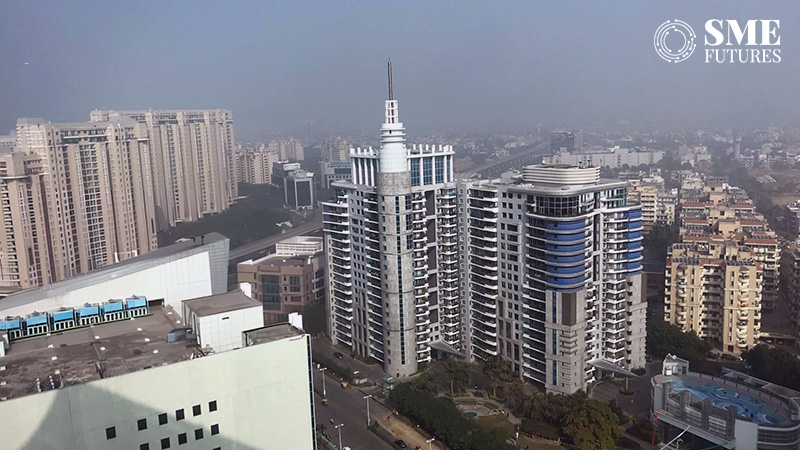India’s housing market defied logic this year to register all-time high sales as home buyers snapped up deals despite a jump in asking prices and the highest interest rates in six years.
Market experts strongly believe the demand will not only sustain in 2024 but rise further, albeit at a slower pace, on high economic growth and expectations of a fall in home loan interest rate.
The real estate industry saw record sales of residential properties in terms of both volumes and value, real estate market data showed as consumers are increasingly buying into the idea of home ownership post-Covid pandemic.
The ouster of dubious developers from the real estate market thanks to greater regulatory oversight via RERA helped boost confidence among home buyers. The insolvency law too has played a role in elimination of defaulting builders.
According to real estate consultant Anarock, housing sales are estimated to rise by 30 per cent this year to a record 4.74 lakh units in primary (fresh sales) markets of top seven cities — Delhi-NCR (National Capital Region), Mumbai Metropolitan Region (MMR), Chennai, Kolkata, Bengaluru, Hyderabad and Pune.
In value terms, the sales of residential properties are seen at a whopping Rs 4.5 lakh crore, supported by higher ticket prices.
Housing prices, which started moving up from last year after remaining stagnant for almost a decade, continued an upward trend and appreciated by an average 14 per cent this year, encouraging investors to return to the primary residential market.
“The changing sentiments of homebuyers — wherein not only are home-renters converting into buyers but also buying bigger homes — has played a huge contributing hand to sectoral and economic growth. The consumer has realised the importance of owning a home and we expect this sentiment to continue in the foreseeable future,” realtors’ apex body CREDAI President Boman Irani told PTI.
Property developers and consultants are of the opinion that the industry is witnessing the “best time” and it is possibly in the first or second year of long-term upcycle.
Sales were strong across price brackets, be it affordable, mid-income, premium and ultra-luxury homes, but what surprised everyone was the huge demand for properties starting from Rs 3-4 crore range to as high as Rs 100 crore.
“The Indian residential real estate sector experienced remarkable growth in 2023, reaching a pinnacle not seen in the past 15 years. On the back of a strong Indian economy, real estate sector is seeing this robust end user-led growth in the residential demand and supply,” Anarock’s Chairman Anuj Puri said.
He expressed confidence that the real estate market will grow further next year.
“Given the ongoing developments and sustained momentum in the Indian economy and residential real estate sector, the upcoming year is poised for continued growth, although the rate of increase may be more moderate due to high base effect,” Puri said.
Sales are expected to surpass supply or maintain equilibrium, he said, adding that prices might rise 8-10 per cent in 2024 across major markets.
Big branded developers having a good track record of executing projects reported sales of entire inventories in their project within a few days, as potential homebuyers and investors queued up to book their flats in large numbers, outstripping the supply.
DLF, the country’s largest real estate firm, announced in March sales of 1,137 luxury apartments, priced Rs 7 crore and above in its housing project in Gurugram for over Rs 8,000 crore within 3 days.
DLF, Prestige Estates, Macrotech Developers and Godrej Properties all reported sales bookings between Rs 12,000 crore and Rs 15,000 crore during the last fiscal year and they expect to better their performance in 2023-24 fiscal.
The consolidation in the housing market, in terms of both supply and demand, gained further momentum towards branded and trusted developers, prompting them to aggressively expand their land bank for future development.
Among other segments of real estate, the demand for office space is estimated to remain flat this year at 37-39 million square feet across seven major cities. There were apprehensions that the leasing or absorption of office space would decline this year because of geopolitical concerns and global economic slowdown.
The flexible space segment expanded their portfolio in a big way to meet demand from corporates who have started adopting managed workspace in lieu of conventional office to save cost and also get rid of facility management.
Leasing of retail space in shopping malls and major high-street locations also increased as retail consumption surged.
The year also saw India’s first retail assets-backed REIT — Nexus Select Trust — sponsored by global investment firm Blackstone, which also made a complete exit from the country’s first REIT — Embassy Office Parks — by selling 23.5 per cent stake for Rs 7,100 crore this month in open market transactions.
REITs are Real Estate Investment Trusts.
Builders also diversified their portfolio to develop warehousing projects and data centres projects. Co-living, which was badly hit during the pandemic, recovered a lot.
In a nutshell, builders are upbeat that the housing market sustained strong demand and was able to post a healthy growth.
Since 2022, the sector has been on an upswing and seems to have overcome disruptions caused by demonetisation, implementation of RERA and GST laws, NBFC crisis and the Covid pandemic.
“The prospect of being the world’s fastest-growing nation, coupled with current affordability levels, is expected to sustain the real estate momentum in 2024. Hopefully with inflation and interest rates getting moderated, we may see 2024 as a record year ahead of 2023 on both supply and demand for residential from end users,” Puri said.
If the growth trend continues, the size of the Indian real estate market will expand in a big way and may reach USD 5.8 trillion by 2047 from USD 477 billion last year, according to a recent NAREDCO-Knight Frank report.











